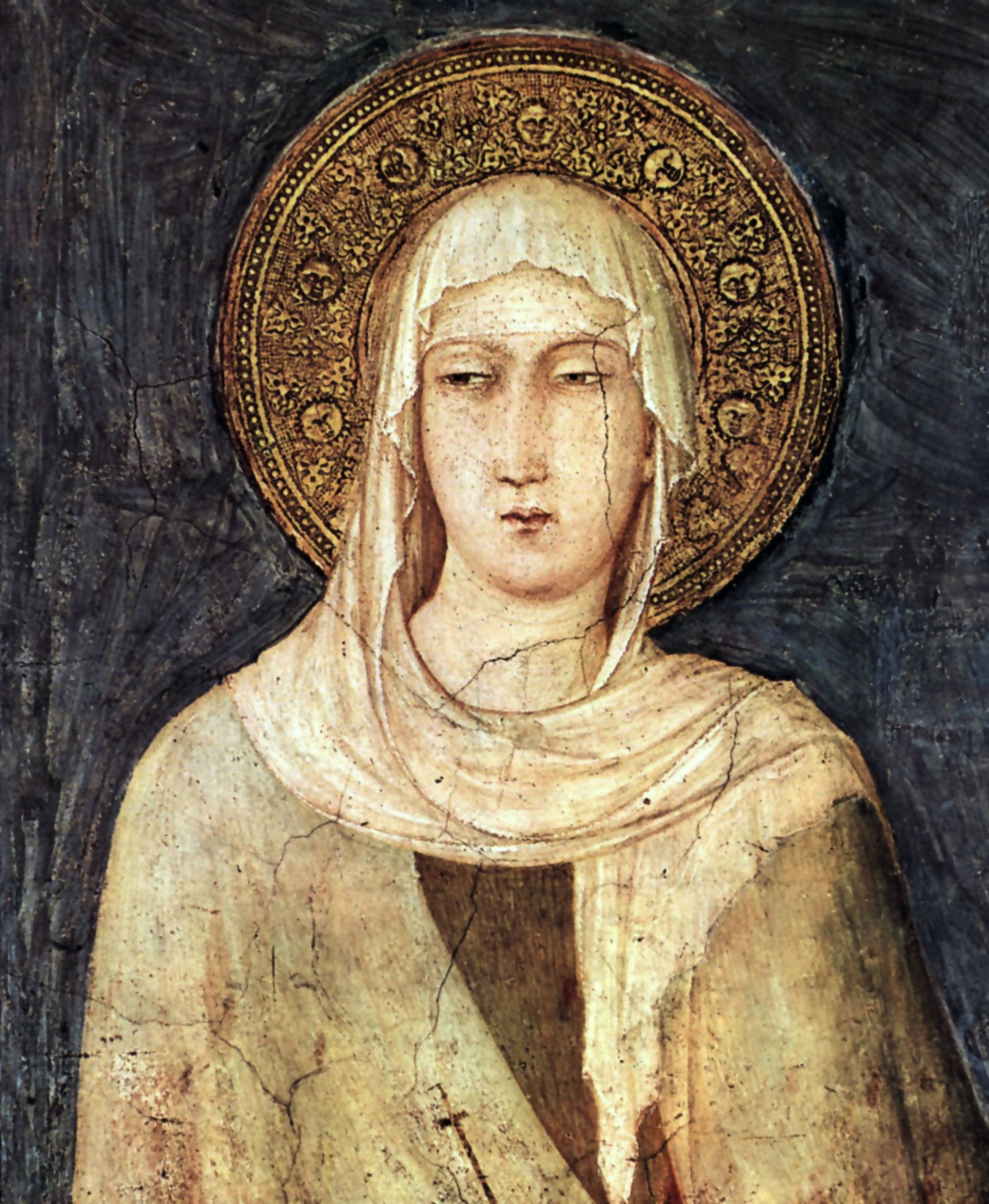
St. Clare of Assisi
August 11
Life (1193-1253)
St. Francis of Assisi is greatly loved as the saint of poverty and simplicity. He had a female counterpart who, inspired by him, founded the women’s Second Order of Franciscans. She was St. Clare of Assisi, and her order is commonly called the Poor Clares.
Clare was of a noble Assisian family, and shared with her sister Agnes a devotional spirit. When she was 18, her fellow townsman, St. Francis, then about 28, preached the Lenten sermons in the church of St. George in Assisi. Clara Offreduccio (that was her full name) was entranced by his exhortation to take the gospel itself as the rule of life. She consulted with Francis afterwards, and he urged her strongly to hold the world in disdain and to devote her life to Christ alone. She accepted the challenge and he pledged to assist her.
On the evening of Palm Sunday, 1212, Clare left home in secret and went to the residence of the Franciscans at the church of the Portiuncula. Here the friars received her solemnly and Francis cut her hair and gave her a tunic of sackcloth to replace her fine clothing. She thus became the first candidate for the Franciscan Second Order. St. Francis had no convent for her at that time so he placed her with some Benedictine nuns in another city.
When her family became aware of Clara’s “elopement”, they came to get her and bring her home. They even tried to pull her away from the altar, it is said; but she would not yield in her purpose. Francis soon transferred her to another convent. There her sister Agnes joined her. Francis eventually secured a modest little home for them next to the Assisi church of San Damiano. He constituted them a religious order and named Clare, despite her protests, to be the superior. Other candidates joined Clare and Agnes there, including even her mother and another sister. The order spread rapidly in Italy, France and Germany. In Prague, Blessed Agnes, the daughter of the King of Bohemia, founded a Franciscan convent. Abbess Agnes and Abbess Clare proved to be kindred spirits.
The Clarissas could not go from town to town preaching, as did the Franciscan friars. But they could practice the dedication to Lady Poverty that was so characteristic of the Friars Minor. They begged their provisions from door to door. Their life in the convent was one of stark simplicity. At the start, the acts of self-denial performed by the nuns were almost appalling. But Clare soon learned the need of discretion; and while austerity remained their common practice, she insisted that it be a “sacrifice seasoned with the salt of prudence”.
The popes at times tried to dissuade St. Clare, as they tried to dissuade St. Francis, from embracing a radical poverty. Some of the Clarissa convents did accept an interpretation of poverty that allowed the community itself to own some property. Clare herself rejected this approach, and drew up a final rule that sustained the ban on all ownership by either the nuns or the convents.
St. Clare governed her convent, despite poor health, for four decades. In her monastery she ruled not by commanding but by serving others, even as Francis did. She had a profound devotion to the Blessed Sacrament, and her face often grew dazzlingly bright as she prayed in its presence.
In 1244 German Emperor Frederic II, at war with the pope, invaded the papal province of Umbria. A detachment of his soldiers who were Muslims came over to plunder Assisi. They first attacked St. Clare’s convent, which was outside the city walls. Clare had the Blessed Sacrament put into a monstrance and set up in a place visible to the invaders outside. Then she prayed that God would protect her sisters and her native city. The answer came in a heavenly childlike voice: “I will have them always in my care.” At that moment the assailants were struck with a strange terror and fled. Both the convent and the city were saved.
St. Clare survived St. Francis 27 years. Three of his dearest friars, Brothers Leo, Angelo and Juniper, as well as her sister St. Agnes, helped her to prepare for death. Her last words could have come from the lips of Francis himself: “Blessed be thou, O God, for having created me.” Have we ever thought of thanking God for bringing us into being?
-- Father Robert F. McNamara